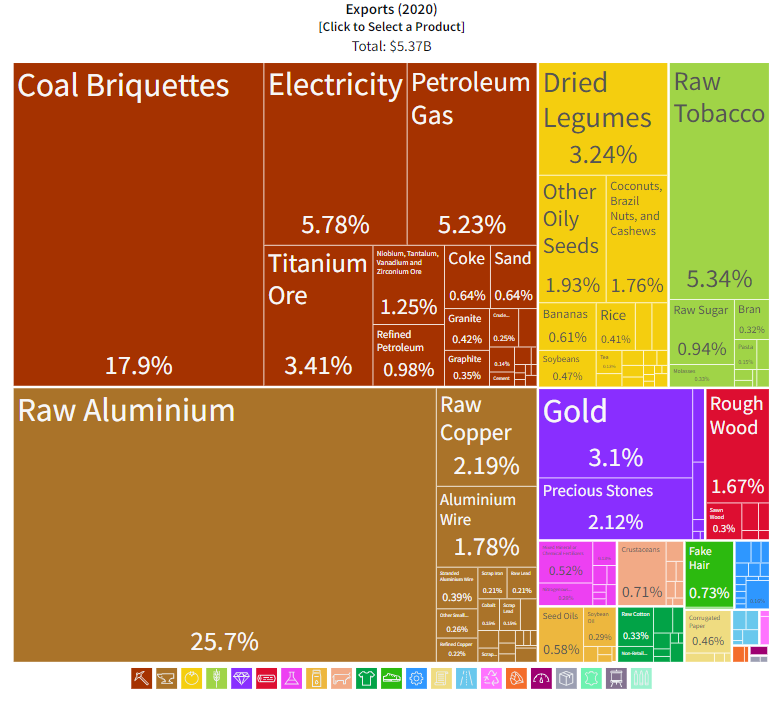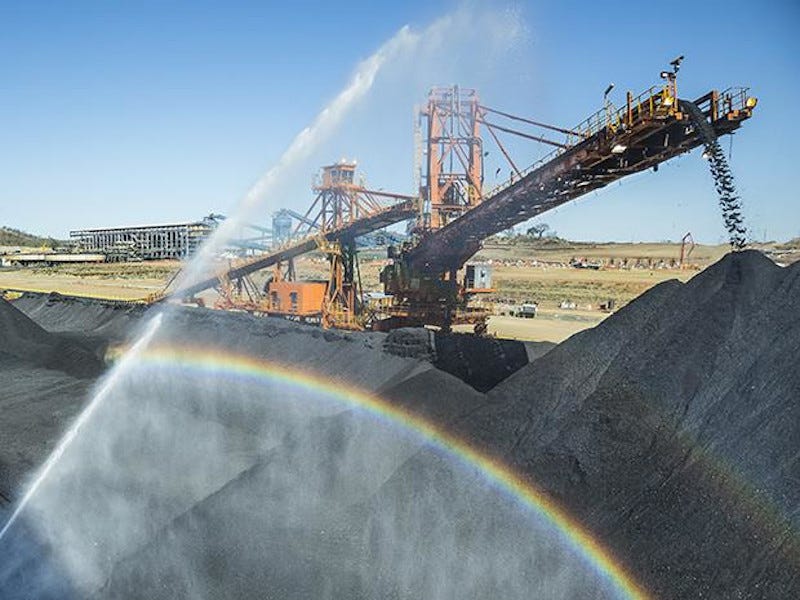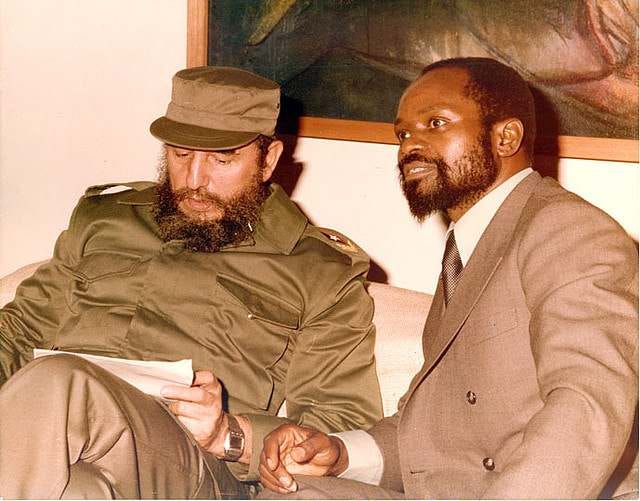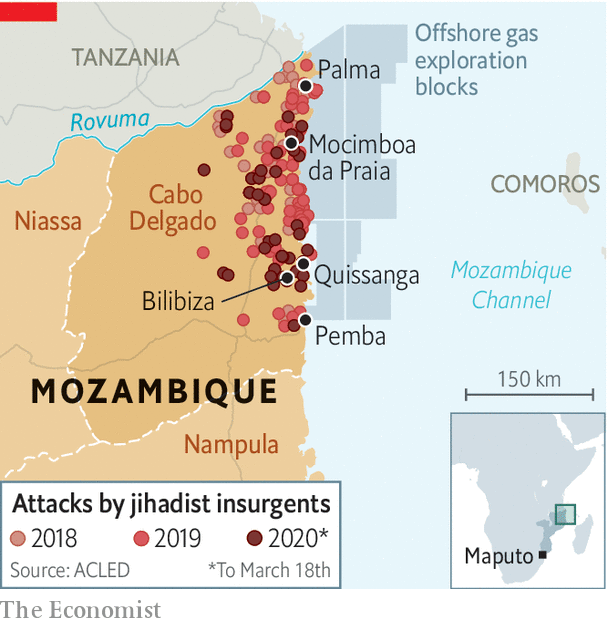The Economic & Geopolitical History of Mozambique
As of 2024, Mozambique isn't even a 50 year old nation-state
Today we will discuss Mozambique. According to the World Bank, Mozambique is a low income country and has a Human Development Index (HDI) of 44.6% in the United Nations Human Development report. However, despite its low rankings it has been improving (although it could improve faster. Mozambique still has to catch up to its neighbors: Malawi: 51.2%, Tanzania: 54.9%, Zambia: 56.5%, Zimbabwe: 59.3%, Eswatini: 59.6%, and of course, South Africa: at 71.3%)

Mozambique was one of the last countries to gain independence in Africa. It was colonized by Portugal. It is also an example of a country that tried and abandoned Marxist-Leninism (communism).
Although health and education measures have been improving, Mozambique still faces significant economic challenges. After the war of independence, the White population, which managed industrial, commercial farming, and entrepreneurial activities, fled to Portugal and Apartheid South Africa. This exodus caused Mozambique's economy to devolve from industrial to subsistence living, followed by a prolonged civil war.
Post civil war, Mozambique has since discovered massive coal and natural gas reserves, including 100 trillion cubic feet of natural gas (14 highest natural gas reserves on earth), surpassing countries like Norway, Kuwait, Libya, and Oman. However, exporting this gas has been hindered by terrorism in the resource-rich Cabo Delgado province. If the insurgency is quelled and gas exports proceed without corruption, Mozambique evolve from one of the poorest countries in the world to becoming the "Kuwait of Africa."

Mozambique, with 35 million people as of 2024, offers gorgeous villas for tourists and has expensive bars & restaurants in the capital Maputo, but for the Mozambican living outside Maputo, life is still challenging. Unfortunately, terrorists control the northeast of the country, actively preventing Mozambique’s government from collecting $100B in natural gas revenue over 25 years. Corruption exists just like in many other nations, and the economy has yet to fully recover from the 2014 commodity bust.

Pre-colonialism:
Mozambique was originally home to San hunters and gathers, then Bantus from Cameroon/Nigeria migrated in the 3rd Century AD. Afro-Arabs traded slaves around the Swahili coast, reaching as far down as Northern Mozambique in the 14th century until the Portuguese came in. Then the Portuguese landed in the 15th century and shipped Africans to Brazil. The Portuguese and Arabs fought over who would own the slave trade in Mozambique & East Africa, but in 1752, Portugal secured Mozambique as a colony.
Portuguese Colonialism:
The borders of Mozambique, like other African nations, disregarded tribal customs, resulting in a mix of Makua people (also in Tanzania), Lomwe people (also in Malawi), the Shona (also in Zimbabwe and South Africa) and the Tsonga (also in Zimbabwe, South Africa and Eswatini).
The Portuguese used Africans as conscripts on sugar, copra and sisal plantations. They forced Mozambicans to make railways to link to British Nyasaland (Malawi). Portugal encouraged white settlement to Mozambique, similar to French Settlement in Algeria or British settlement in South Africa.
Cities like Maputo and Beira, looked like modern European cities, with newspapers, broadcasting stations, museums and sports clubs.
Americans often view WW2 as a fight against “universal fascism” since U.S. fought against fascist states like Nazi Germany and Mussolini’s Italy. In reality, the U.S. & UK just fought against those particular fascists that threatened them and their allies. They left Francisco Franco’s Fascist Spain and Antonio De Salazar’s Fascist Portugal in tact, with Portugal even joining NATO in 1949. This is significant because in the 1960s, Portugal openly launched brutal, decade-lasting, borderline genocidal wars against their colonies Angola, Mozambique, & Guinea-Bissau while Britain and France were reluctantly granting their colonies independence.
War for Independence(1962-1975) & Civil War(1977-1992)
As Africa was decolonizing in the 1950s and 60s, Salazar’s Portugal quadrupled down on colonialism. In 1964, the Mozambique Liberation Front (FRELIMO), led by Eduardo Mondlane and comprising of African intellectuals, migrant workers, and communists formed in Tanzania to fight for Mozambican independence.
The Soviet Union and China sought to destabilize European control over Africa for ideological(anti-colonialism = anti capitalism to them), geopolitical, and resource-related reasons. Firstly, they ideologically hated colonialism/imperialism which they associated with capitalism. (Idk why Soviet Union didn’t see its forced control & forced atheism of Muslim Central Asia — Kazakhstan, Tajikistan, and etc. as colonialism but whatever). These countries along with, Cuba, and the Organization of African Unity funded & provided food to FRELIMO. Meanwhile, apartheid Rhodesia & South Africa supported Portugal and had mining rights in South Mozambique. By 1974, Portugal underwent the carnation revolution, and the Portuguese people removed Caetano from office, ended fascist rule, and eradicated the colonial empire. When the newly democratic Portugal was relinquishing power, the FRELIMO requested sole representation without an election, angering some Mozambicans.
Independence, Marxist “People’s Republic of Mozambique”
In 1975, Mozambique became the “People’s Republic of Mozambique”, under the rule of FRELIMO leader Samora Machel. He made the government one-party Marxist Leninist and modelled policies from the Soviet Union, Cuba, & Maoist China. (Machel was also the first open atheist president of an African Country). The state Machel inherited was in shambles due to the independence war and 90% of the population was illiterate. Soviet leaders sent engineers and operators to help rebuild their infrastructure. Industries like energy utilities, aluminum exporting, and mining were run by state owned companies instead of private entrepreneurs. Former colonial and company plantations were replaced with government-run or co-operative farming. Machel nationalized education, land (no one owned their land, you leased the land from the government), media and business. The state owned media and education system became a propaganda machine, routinely painting “colonialism, imperialism, tribalism, superstition, exploitation, illiteracy, poverty, and capitalism” as the enemies of Mozambique.
Immediately after independence, the Apartheid States of Rhodesia (modern day Zimbabwe) and Apartheid South Africa attempted to sabotage both newly independent Angola & Mozambique. The existence of Mozambique & Angola, illustrated that a white minority, even with its military power, could not subjugate the black majority forever. Apartheid Rhodesia and South Africa felt threatened, so they created Mozambique’s civil war. In response, Machel took authoritarian control to fight the Apartheid states and the traitorous Mozambicans the Apartheid states funded. Here’s a balanced view of Machel’s rule:
Pros of Machel:
With the incredibly meager government revenue he had, he tried investing in education, healthcare, and women’s employment, resulting in doubling of primary school students in 7 years and quadrupling of health clinics in 10 years.
He eradicated the insane sex trade. There used to be over 70K prostitutes in the capital.
He nationalized healthcare. Private and Catholic hospitals were abolished , because the Church had allied with Salazar’s Portugal. He kickstarted a national health service & mass vaccination program that reached 90% of the population by 1987, the year after Machel died.
Controversial:
Due to some of the White Portuguese trying to sabotage Machel’s administration, Machel forcefully expelled the White Portuguese (many were leaving anyway). 300K White Portuguese left, which unfortunately meant all of Mozambique’s professional, entrepreneurial, and tradesmen class disappeared, leading to economic collapse afterwards. Machel regretted this. He even told Mugabe as he was taking over Zimbabwe “Don’t play make-believe Marxist games when you get home. You will face ruin if you force the whites into precipitate flight.”
To combat tribalism, Machel destroyed the local authority of shamans and tribal chiefs, pissing off many local Mozambicans.
To combat unemployment, Machel forced 2M people to leave cities to live in villages and work in communal farms (villagization program). Samora’s rationale was the fact that were many unemployed people in Maputo, the capital, and there were huge tracks of open land in rural areas. Many Mozambicans hated this program.
The farming land was turned into either state-owned farms (90%) or co-operative farms (2%) and Machel centralized agricultural production and investment (The government would pay people, and bureaucrats ran farming production quotas and investment from the capital, as opposed to letting people run their own farms and produce for themselves and sell to other people).
8% of Mozambicans ran illegal, black market, farming economies that illegally escaped Machel’s planning, and they produced more agricultural yield than the centrally managed lands.
To combat “superstition”, Machel repressed religious faith for a few years.
The results:
The forced and unsuccessful villagization program and attempted eradication of tribal customs & religion angered many rural Mozambicans. This anger was exploited by the apartheid states, who used these angry, rural Mozambicans to undermine Communist Mozambique through the RENAMO terror group. They also received support from Evangelical American organizations and inflicted horrific violence, including mutilation of children, destruction of rural railroads & roads with land mines, destroying hospitals, and burning schools. Kids were fighting wars instead of going to school. The conflict displaced 5M people and caused 1M people dying from starvation. Machel spent half of his budget combatting these people and funding Robert Mugabe’s anti-apartheid fighters in Rhodesia.
Due to the civil war, Machel used his secret police to jail anyone he perceived as a threat to national harmony/corrupt/starting a new political party to kill the “inimigo interno” (enemy within) He sent up 20+ reeducation/interment camps to detain, lash, murder, and “socially purify” over 100K REMANO supporters, prostitutes, alcoholics, lazy people, and criminals, often without trial or judicial hearing).
State ownership of heavy industries has made Mozambique (and other African nations) susceptible to corruption, which plagues Mozambique today. In a modern example, in 2013, a clique of government officials made three state owned enterprises that took $2B of debt (12% of their GDP) from Credit Suisse, Russia’s VTB & France’s BNP Paribas and stole the money, which was meant for shipyard construction and tuna fishing development. State owned firms can operate as black boxes for corruption as high ranking public officials can divert funds with ease and hide corruption through shady accounting, instead of using profits for reinvestment in capital expenditures, wages or R&D. This is different from the capitalist West, where most firms are private and most of government revenue is collected through consumption, corporate, or income taxes. The government has to collect taxes from the profits of the firm. Private firms are incentivized to lower their tax liability legally as much as possible to return profits to shareholders, making it very hard an American public official to steal profits directly from firms like Google.
Ideology turning
By 1980, the black freedom fighters ended white rule in Rhodesia, resulting in the formation of Zimbabwe, ending one of Machel’s enemies. By 1983, Machel knew he had to adapt some form of capitalism, by introducing market forces so people can feed themselves. Due to the Soviet Union’s struggles in the war in Afghanistan and due to falling oil prices, Russia was losing the ability to fund Mozambique. By 1985, Mozambique reached out to the West through the IMF and World Bank. This led to Mozambique undergoing a structural adjustment program, requiring a transition to democracy and capitalism, effectively ending Mozambique as a Marxist-Leninist state.
Machel’s Death (1986) , Joaqium Chissano’s rule (1986-2005)The new “Republic of Mozambique” (1990-Present) & The end of the Civil War(1992)
Samora Machel died in a plane crash in South Africa in 1986. While the exact cause of his death remains unclear, most people believe the crash was orchestrated by Apartheid South Africa. Hs successor, Joaqium Chissano, continued with the structural adjustment program (SAP) Machel started. Under IMF mandate, Joaqium had to make democratic and capitalist reforms. By 1990, Mozambique changed its constitution and changed from “People’s Republic” (1 party Marxist Leninist state) to “Republic” (liberal multiparty democracy).
Chissano’s efforts to implement market & democratic reforms earned Mozambique the ability to apply for debt relief under the “Heavily Indebted Poor Country” initiative, debt relief from the World Bank in 1998. In 1998, Mozambique had $8.3B in external debt. By 2001, the debt was reduced to $4.5B. He began peace talks with RENAMO and made a new constitution making free elections.
The program meant privatizing bankrupt state-owned companies in airports, telecom, water service, and introducing taxes like the Value Added tax instead of depending on revenue from government corporations. The transition was not without challenges, as newly private enterprises had to cut jobs to increase efficiency and profits, causing an increase in unemployment. (This process was so painful that Mozambique gradually privatized, the process is still happening today). Mozambique also had to open up to foreign investors.
Mozambique also had to devalue their currency (the central bank deliberately decreasing the value of their currency relative to other currencies) in order to make Mozambican exports cheaper for foreign companies to buy Mozambican goods & thus shrink the trade deficit (export/import ratio will go from less than 1 to hopefully more than 1 by selling cheaper exports). But devaluing currency also means importing food & fuel from other nations becomes more expensive, causing skyrocketing inflation. People left Mozambique for greener pastures in Portugal & South Africa, causing a “brain drain”. By 1992 the civil war ended with 93% of people living in multidimensional poverty (lacking food, money, infrastructure, electricity, and education). 1.5M Mozambican refugees returned after the war ended. To prevent mass starvation, Mozambique relied on foreign aid. It took until 1995 for the people’s living standards to start improving, almost a decade after the SAP started.
He was reducing poverty, but efforts messed up due to a catastrophic three week flood in 2000 that drowned the capital, damaged the irrigation system, wrecked 15K square kilometers of land, causing 100s to die of starvation.
Armando Guebueza (2005-2015)
Guebuza, a former business tycoon turned president, became wealthy from the 2nd president’s privatization efforts. As Mozambique rode the wave of the 2000-2014 commodity boom, not only did living standards soar in the country, but across much of Africa too.

Fast forward to 2011, Mozambique struck “black gold” (coal) and as of 2021, Mozambique has quickly climbed to become the 9th largest coal exporter. This is partly due to Chinese investment in their coal industry. It is also spending in infrastructure projects from its coal revenue, which has expanded employment opportunities in infrastructure, construction, and mining. China has also lent $725M in loans to Mozambique which helped it make government buildings, roads, the national stadium, and the new Maputo-Catembe suspension bridge. But the real win? Multidimensional poverty decreased from 93% to 71%. Human development has doubled from .22 to .446.
Fillipe Nyusi administration (2015-Present)
Climate Issues
In 2019, Cyclone Idai & Cyclone Kenneth rampaged the country killing 1000s of people, ruining infrastructure and causing a humanitarian crisis..
Debt Default
Due to commodity price collapse and corruption, Mozambique defaulted on debt in 2017. Terrorism and tornados have stymied economic growth so much that Mozambique’s living standards have fallen to 2007 levels.
War on Ansar al-Sunna & Mozambique Al-Shabaab
Nyusi’s government is battling the Salafist groups, al-Sunna Ansar and Mozambique Al-Shabaab, in the north’s Cabo Delgado province. This mostly Muslim region, home to the Mwani ethnic group, is a treasure trove of natural gas in the Rovuma basin with 100 trillion cubic feet of untapped gas reserves.
If tapped, Mozambique can become the African Kuwait, rocketing it to be the third largest exporter of natural gas on the continent, trailing only behind Nigeria & Algeria. But these terrorist groups are throwing a wrench in Mozambique’s plans, killing over 4000 people since 2017 and hindering multinationals (i.e. U.S. ExxonMobil & French TotalEnergies) from setting up shop.
The terrorists are ruining Mozambique’s strategic goals since Mozambique aims to position itself to be a natural gas exporter for the European Union instead of Russia. Mozambique also wants to use the natural gas revenue to create a sovereign wealth fund like Botswana did with its diamond revenues.
The terrorist groups have displaced around 800K people in the country. Fillipe has been reaching out to Paul Kagame of Rwanda, paying Russian mercenaries (the Wagner group), and asking for American, British, and European Union to train the Mozambique military & kill terrorists. The terrorist groups claim that they hate Mozambique’s secular constitution, and want to establish an Islamic state and impose Sharia.
But materially, the root problem lies in the chronic neglect of poverty in the North by successive Mozambique governments. The region suffers from disproportionate high rates of early marriage , massive displacement camps, and overcrowded homes due to lack of housing.
When, Mozambique discovered that the massive natural gas in Cabo Delgado, it awarded the contract to French firm, Total Energies. Unfortunately, the firm has been accused of displacing and abusing local people in the province. The United States’ Export-Import Bank was the largest lender of the project, providing nearly $5B.
Due to the lack of trust in the government, some of the local people of Cabo Delgado support the jihadists over the state. These terrorists are mainly uneducated, poor, young Mozambican men with limited economic opportunities, who see joining this perverted terrorist organization as a way to shout their grievances and find a sense of community. Very few Cabo Delgado locals believe the profits from the natural gas reserves will towards improving their lives.
In short, as of 2024, Mozambique is a young independent country, (~50 years old!) that was plagued with a bad start due to Portuguese, Apartheid South Africa, & Apartheid Rhodesian suppression. The first president of Mozambique, Machel was a key fighter for independence in Zimbabwe and pushed back against white Apartheid rule.
Mozambique is still working on becoming a lower-middle income country (i.e. Ghana, Ivory Coast, Kenya, or Cameroon). If Mozambique can solve the terrorism crisis and export natural gas, then the nation can quickly flourish to middle income status quickly like Angola did.
Sources are linked!









I hope they can get the terrorist situation under control. With the European\Russia situation being what it is there should be a good market for natural gas. Also the resort picture was great. There seems to be tourism potential.
Why is corruption so flagrant and self-defeating in Africa?